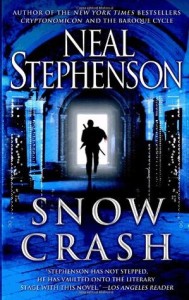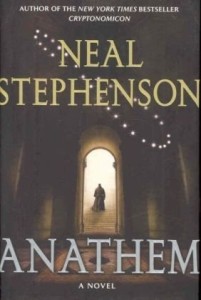I first heard of Neal Stephenson when one of the beta readers of a very early draft of Broken Mirror told me it reminded him of Snow Crash, a cyberpunk novel first published in 1992.

When I got around to reading Snow Crash, I was floored (in a good way). So many humorous descriptions of overtly branded and soul-sucked exurbia combined with a shockingly forethoughtful cyberscape to hook me right away. Adding in a sword-toting protagonist named Hiro Protagonist and a skateboard-riding teen femme fatale–Really, I need to stop here in case you haven’t read the book: Go read it now! Classic, entertaining cyberpunk. Not to be missed.
For those who have read Snow Crash or his other books, you understand how Neal’s books get under your skin with interesting action at the surface and kilometers of deep, science-based philosophizing underneath. He’s every bit an Arthur C. Clarke “hard sci-fi” devotee plus he brings the action and humor of Robert Heinlein and Douglas Adams combined, respectively. As you can tell, I’m a fan of Neal’s work.
So when I started to read Anathem and then felt compelled to put it down for being too dense, I didn’t know what to think. Was I literally not a smart enough nor devoted enough fan to appreciate this book? Had Neal written this book with so narrow an audience in mind that he hadn’t meant for me to read it? Was it (or was I) a lost cause?
Over the course of last year, I picked up the book two more times and stopped, despairing that I would ever finish. The made-up terminology was off-putting. I couldn’t tell what was at stake. The characters didn’t really seem all that distinct and would stop the story so they could argue some seemingly irrelevant philosophical point.

A few weeks after Broken Mirror was published, I picked up Anathem again.
I hit the same speedbumps while reading as before, but I was determined to power through.
Then something happened, either in my brain or in the story or somehow both quasi-entangled events happened around the same time. It was pure magic.
My conversion happened like this: One of the characters notices something in the sky, which he is not supposed to see because his ascetic “mathic order” (kind of like monks who do math) are supposed to focus solely on abstract “theorics” and are forbidden from using many technologies, including telescopes. And very quickly the whole world goes crazy and the story is off and running. We learn more about the world, we’re treated to semi-Socratic debates about the nature of reality and consciousness, and everything in the story becomes a treat. Neal’s spell is complete and we are enthralled by his words and his world.
Seriously, this is an author who makes reading dialogue about the multiverse and our place in it a treat.
I’m nearing the end of the book. I hope it doesn’t come too soon. I have a lot more on my reading list, but I suspect I’m going to be tempted to re-read Anathem with a newfound understanding of the majesty that Neal has written. Five stars.